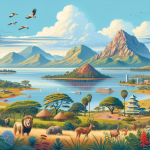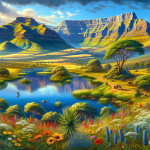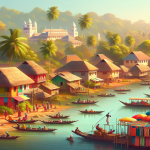Discovering the Hidden Gems of Uganda: The Pearl of Africa
Uganda, often referred to as the “Pearl of Africa,” is a quintessential destination for any avid traveler seeking both adventure and tranquility. Nestled in East Africa, Uganda boasts an incredible array of natural wonders, from the sprawling savannas to the lush rainforests and serene lakes. This landlocked country is home to an astonishing array of wildlife, including the iconic mountain gorillas, making it a top destination for eco-tourism. Uganda’s rich cultural heritage, coupled with its warm and welcoming people, creates an atmosphere that is as inviting as it is intriguing. In this comprehensive guide, we will delve deep into the myriad attractions and experiences that make Uganda a must-visit destination, exploring everything from its national parks and wildlife reserves to its vibrant cities and cultural landmarks. Whether you’re a seasoned explorer or planning your first trip to Africa, Uganda promises an unforgettable journey filled with awe-inspiring sights and heartwarming encounters.
Exploring Uganda’s National Parks
Bwindi Impenetrable National Park
Bwindi Impenetrable National Park is perhaps Uganda’s most famous destination, largely due to its population of endangered mountain gorillas. Trekking through the dense rainforest to observe these magnificent creatures up close is a once-in-a-lifetime experience. The park also offers a rich diversity of bird species, making it a haven for bird watchers.
Murchison Falls National Park
Murchison Falls National Park, named after the dramatic Murchison Falls where the Nile River explodes through a narrow gorge, is another highlight. The park is teeming with wildlife, including elephants, lions, and hippos. A boat cruise along the Nile offers an unparalleled view of the falls and the abundant wildlife along the riverbanks.
Queen Elizabeth National Park
Queen Elizabeth National Park is renowned for its stunning scenery and diverse ecosystems. Spanning savannas, forests, and wetlands, the park is a sanctuary for a wide variety of animals, including tree-climbing lions and over 600 bird species. The Kazinga Channel, which connects Lake Edward and Lake George, is a prime spot for boat safaris.
The Unique Wildlife of Uganda
Mountain Gorillas
Uganda is one of the only three countries in the world where you can see mountain gorillas in their natural habitat. Gorilla trekking in Bwindi Impenetrable National Park and Mgahinga Gorilla National Park offers a unique opportunity to observe these gentle giants.
The Big Five
Uganda is home to Africa’s “Big Five” – lions, elephants, buffaloes, leopards, and rhinos. These can be spotted in various national parks, offering a thrilling safari experience. The Ziwa Rhino Sanctuary is particularly notable for its efforts in rhino conservation.
Bird Watching
With over 1,000 bird species, Uganda is a paradise for bird watchers. The country’s diverse habitats provide opportunities to see a wide variety of birds, including the rare shoebill stork. Mabamba Swamp and Bwindi Impenetrable National Park are particularly popular bird-watching spots.
Cultural Experiences in Uganda
Kampala
Kampala, the capital city, is a bustling metropolis that offers a blend of modernity and tradition. The city is home to several cultural sites, including the Uganda Museum and the Kasubi Tombs, a UNESCO World Heritage site. Kampala’s vibrant nightlife and bustling markets provide a taste of contemporary Ugandan life.
Traditional Festivals
Uganda’s cultural festivals offer a glimpse into the country’s rich heritage. The Nyege Nyege Festival, held annually in Jinja, is a celebration of music and culture, drawing artists and visitors from around the world. The Imbalu Circumcision Ceremony of the Bagisu people is another significant cultural event, showcasing traditional rituals and dances.
Local Cuisine
Ugandan cuisine is a delightful blend of flavors and influences. Staples like matoke (steamed green bananas) and posho (maize flour) are often accompanied by rich stews and grilled meats. Street food, such as the popular Rolex (a rolled chapati filled with eggs and vegetables), offers a quick and tasty snack for travelers on the go.
Adventure Activities in Uganda
White-Water Rafting on the Nile
For thrill-seekers, white-water rafting on the Nile River is an exhilarating experience. Jinja, known as the adventure capital of Uganda, offers various rafting packages ranging from mild to extreme. The rapids provide a thrilling challenge, while the calmer sections of the river allow for scenic views and relaxation.
Hiking and Trekking
Uganda’s diverse landscapes provide numerous opportunities for hiking and trekking. The Rwenzori Mountains, also known as the “Mountains of the Moon,” offer challenging climbs and breathtaking scenery. The Sipi Falls in the eastern part of the country is another popular trekking destination, known for its stunning waterfalls and coffee plantations.
Wildlife Safaris
Uganda’s national parks offer some of the best wildlife safaris in Africa. Whether you’re exploring the savannas of Queen Elizabeth National Park or the wetlands of Lake Mburo National Park, the chance to see a wide variety of animals in their natural habitat is unparalleled. Guided safaris provide valuable insights into the behavior and ecology of the wildlife.
Practical Information for Travelers
Best Time to Visit
The best time to visit Uganda is during the dry seasons, from December to February and June to August. During these periods, wildlife is easier to spot, and outdoor activities are more enjoyable. However, Uganda’s diverse climate means that different regions can be visited year-round.
Visa and Entry Requirements
Visitors to Uganda typically need a visa, which can be obtained online through the Uganda Electronic Visa/Permit System. Ensure your passport is valid for at least six months beyond your planned departure date. It’s also recommended to check for any health advisories and necessary vaccinations before traveling.
Getting Around
Uganda has a variety of transportation options, including domestic flights, buses, and car rentals. While major cities like Kampala have good road networks, some rural areas may have less developed infrastructure. Hiring a local guide or joining a tour can enhance your travel experience and ensure safety.
Sustainable Tourism in Uganda
Conservation Efforts
Uganda has made significant strides in conservation, particularly in protecting endangered species like mountain gorillas and rhinos. National parks and wildlife reserves play a crucial role in these efforts, and many tourism activities directly support conservation initiatives. Participating in responsible tourism helps preserve Uganda’s natural beauty for future generations.
Community-Based Tourism
Community-based tourism initiatives allow travelers to connect with local communities and contribute to their development. Programs like homestays, cultural tours, and craft workshops provide authentic experiences while supporting local livelihoods. Engaging with these initiatives enriches your travel experience and fosters cultural exchange.
Eco-Friendly Accommodations
Uganda offers a range of eco-friendly accommodations, from luxury lodges to budget campsites. Many of these establishments prioritize sustainability by using renewable energy, reducing waste, and supporting local communities. Choosing eco-friendly lodgings helps minimize your environmental impact and supports responsible tourism practices.
Uganda’s Natural Wonders
Lake Victoria
Lake Victoria, the largest lake in Africa, is a vital water source and a hub for various activities. The lake’s islands, such as Ssese Islands, offer serene retreats with beautiful beaches and lush vegetation. Fishing, boating, and bird watching are popular activities around the lake.
The Nile River
The Nile River, the longest river in the world, begins its journey in Uganda. The source of the Nile at Jinja is a significant historical and geographic landmark. Boat trips and white-water rafting on the Nile provide thrilling adventures and stunning scenery.
The Rwenzori Mountains
The Rwenzori Mountains, a UNESCO World Heritage site, are renowned for their dramatic landscapes and diverse ecosystems. The mountains offer challenging trekking routes with spectacular views of glaciers, valleys, and unique flora and fauna. The Margherita Peak, the highest point in the range, is a sought-after destination for climbers.
Health and Safety Tips
Health Precautions
Before traveling to Uganda, consult with a healthcare professional about necessary vaccinations and health precautions. Malaria is prevalent in some areas, so taking antimalarial medication and using insect repellent is advisable. It’s also essential to drink bottled or purified water to avoid waterborne illnesses.
Safety Tips
While Uganda is generally safe for tourists, it’s important to take standard travel precautions. Be aware of your surroundings, especially in crowded areas, and keep your belongings secure. Hiring reputable guides and using trusted transportation services can enhance your safety and overall travel experience.
Travel Insurance
Investing in comprehensive travel insurance is crucial for any trip, including Uganda. Ensure your policy covers medical emergencies, trip cancellations, and lost belongings. Having travel insurance provides peace of mind and financial protection in case of unexpected events.
Conclusion
Uganda, with its breathtaking landscapes, diverse wildlife, and rich cultural heritage, offers an unparalleled travel experience. Whether you’re trekking through rainforests to see mountain gorillas, rafting on the Nile River, or immersing yourself in local traditions, Uganda promises unforgettable adventures and meaningful connections. By embracing sustainable tourism practices and supporting conservation efforts, you can help preserve the natural and cultural treasures of this remarkable country. So pack your bags, embark on an extraordinary journey, and discover why Uganda truly is the “Pearl of Africa.”
For more detailed information on planning your trip to Uganda, visit the official Uganda Tourism Board website here.








